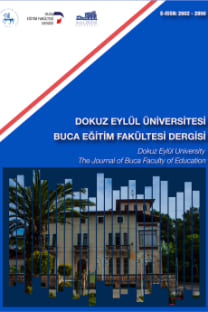SINIF ÖĞRETMENİ ADAYLARININ BİLİMİN DOĞASI KAVRAMLARI HAKKINDAKİ YANLIŞ ANLAMALARI
Bilimin doğası, bilimsel bilgi, bilim insanı
PRE-SERVICE PRIMARY SCHOOL TEACHERS’ MISUNDERSTANDINGS ABOUT NATURE OF SCIENCE
Nature of science, scientific knowledge, scientist,
___
- Abd-El-Khalick, F., Bell, R.L., & Lederman, N.G. (1998). The nature of science and instructional practice: Making the unnatural natural. Science Education, 82, 417-436.
- Abd-El-Khalick, F. & Boujaoude, S. (1997). An exploratory study of knowledge base for science teaching. Journal of Research in Science Teaching, 34, 673–699.
- Abd-El- Khalick & Lederman N.G. (2000) “The influence of history of science courses on students views of nature of science. Journal of Research in Science Teaching, 37(10), 1057-1095.
- Aikenhead, G.S., Fleming, R.W., & Ryan, A.G. (1987). High school graduates’ beliefs about science-technology- society. I. Methods and issues in monitoring student views 1. Science Education, 71(2), 145-161.
- American Association for the Advancement of Science (AAAS). (1993). Bencmarks for Science Literacy: A Project 2061 Repots. New York: Oxford University Press.
- Aslan, O., Yalçın, N. ve Taşar, M.F. (2009). Fen ve teknoloji öğretmenlerinin bilimin doğası hakkındaki görüşleri. Ahi Evran Üniversitesi Eğitim Fakültesi Dergisi, 10(3), 1-8.
- Balkı, N., Çoban, A ve Aktaş, M. (2003). İlköğretim öğrencilerinin bilim ve bilim insanına yönelik düşünceleri. Uludağ Üniversitesi Eğitim Fakültesi Dergisi, 17(1).
- Bora, N.D. (2005). Türkiye Genelinde Ortaöğretim Fen Branşı Öğretmen ve Öğrencilerinin Bilimin Doğası Üzerine Görüşlerinin Araştırılması. Yayınlanmamıs Doktora Tezi. Gazi Üniversitesi, Ankara.
- Craven, J. A., Hand, B., & Prain, V. (2002). Assessing explicit and tacit conceptions of the nature of science among preservice elementary teachers. International Journal of Science Education, 24(8), 785-802.
- Çelik, S. (2003). Öğretmen Adaylarının Bilim Anlayışları ve “Fen, Teknoloji ve Toplum” Dersinin Bu Anlayışlara Etkisi. Yayınlanmamış Yüksek Lisans Tezi, Atatürk Üniversitesi, Erzurum
- Çelikdemir, M. (2006). Examining Middle School Students’ Understanding of the Nature of Science. Unpublished Master’s Thesis. Middle East Technical University The Graduate School of Natural and Applied Sciences: Ankara.
- Doğan, A., Akçay, H., Kaya, O. ve Öcal E. (2008).İlköğretim öğrencilerinin bilim insanı hakkındaki görüşleri (özet Kitabı). VIII. Ulusal Fen Bilimleri Ve Matematik Eğitimi Kongresi (s.140) Bolu Abant İzzet Baysal Üniversitesi Eğitim Fakültesi.
- Griffiths, A. K., & Barry, M. (1993). High school students’ views about the NOS. School Science and Mathematics, 93(1), 35-37.
- Gürses, A., Doğar, Ç. ve Yalçın, M. (2005). Bilimin doğası ve yüksek öğrenim öğrencilerinin bilimin doğasına dair düşünceleri. Milli Eğitim Dergisi, 166.
- Haidar, A.H. (1999). Emirates pre-service and in-service teachers’ views about the nature of science. International Journal of Science Education, 21(8), 807–822.
- Kang, S., Scharmann, L. C. & Noh, T. (2005). Examining students’ views on the nature of science: Results from Korean 6th, 8th, and 10th Graders. Science Education, 89, 314– 334.
- Kılıç, K., Sungur, S., Çakıroğlu, J. ve Tekkaya, C. (2005). Ninth Grade Students’ Understanding of the Nature of Scientific Knowledge, Hacettepe Üniversitesi Eğitim Fakültesi Dergisi, 28, 127-133.
- Lederman, N.G. (1992). Students’ and teachers’ conceptions of the nature of science: A review of the research. Journal of Research in Science Teaching, 29(4), 331-359.
- Lederman, N.G. & Lederman J.S. (2004). Revising Instruction to Teach Nature of Science. The Science Teacher, 71(9), 36.
- Macaroglu, E., Taşar, M. F. ve Cataloglu, E. (1998). Turkish Preservice Elementary School Teachers' Beliefs about the Nature of Science. Annual Meeting of National Association for Research in Science Teaching (NARST), San Diego, CA.
- McComas, W.F., Almazroa, H., & Clough, M.P. (1998). The nature of science in science education: An introduction. Science & Education, 7, 511-532.
- Mcmillan J.H. & Schumacher, S. (2001). Research in Education: A Conceptual Introduction. (5th Edtion), pp. 660, London, UK.
- Moss, D.M., Abramsand, E.D. & Robb, J. (2001). Examining student conceptions of the nature of science. International Journal of Science Education, 23(8), 771- 790.
- Murcia, K., & Schibeci, R. (1999). Primary student teachers’ conceptions of the nature of science. International Journal of Science Education, 21(11), 1123-1140.
- National Research Council (NRC). (2000). Inquiry and the National Science Education Standards. Washington, DC: National Academy Press.
- National Research Council (NRC). (1996). National Science Education Standards. Washington, DC: National Academy Press.
- Rubba, P.A., & Andersen, H. (1978). Development of an instrument to assess secondary school students’ understanding of the nature of scientific knowledge. Science Education, 62(4), 449-458.
- Shiang-Yao, L., & Lederman, N. G. (2002). Taiwanese gifted students’ views of the nature of science. School Science and Mathematics, 102(3), 114-124.
- Tairab, H.H. (2001). How do pre-service and in-service science teachers view the nature of science and technolgy? Research in Science and Technological Education, 19(2), 235- 250.
- Taşar, M.F. (2003). Teaching history and the nature of science in science teacher education programs. Pamukkale Üniversitesi Eğitim Fakültesi Dergisi, 1, 30-42.
- Thye, T. L., & Kwen, B. H. (2003). Assessing the nature of science views of Singaporean preservice teachers. Paper presented at the annual confernce of the NewZealand/ Australian Association for Reseach in Education, Auckland.İletişim 208
- Turgut, H. (2009). Fen bilgisi öğretmen adaylarının bilimsel bilgi ve yöntem algıları. Türk Eğitim Bilimleri Dergisi, 7(1), 165-184.
- Yakmacı, B. (1998). Science (biology, chemistry and physics) Teachers’ Views on the Nature of Science as a Dimension of Scientific Literacy. Unpublished Master’s Thesis. Boğaziçi University, İstanbul.
- Yayın Aralığı: Yılda 4 Sayı
- Başlangıç: 1992
- Yayıncı: Dokuz Eylül Üniversitesi
ANORGANİK KİMYA DERSİNDE WEB DESTEKLİ İŞBİRLİKLİ ÖĞRENMEYE YÖNELİK ÖĞRENCİ GÖRÜŞLERİ
TÜRKİYE’NİN ALAN ÖĞRETMENİ YETİŞTİRME DENEYİMLERİ VE SÜRDÜRÜLEBİLİR YENİ MODEL YAKLAŞIMLARI
MÜZĠK ÖĞRETMENĠ ADAYLARININ PĠYANO DERSĠNE YÖNELĠK TUTUMLARININ DEĞERLENDĠRĠLMESĠ
İLKÖĞRETİM II. KADEME TÜRKÇE DERSİ ÖĞRETİM PROGRAMINA İLİŞKİN ÖĞRETMEN GÖRÜŞLERİ
Erdoğan Özdemir, Ayşegül Benli, Duygu Dörtlemez, Rabia Tanel, Serap Kaya, Nevzat Kavcar
ORTAÖĞRETİM ÖĞRENCİLERİNİN KÜRESEL ISINMA HAKKINDAKİ BİLGİLERİ ÜZERİNE BİR ARAŞTIRMA
Özge ÖZBAYRAK, Melis Arzu UYULGAN, Şenol ALPAT, Sibel KILINÇ ALPAT, Mehmet KARTAL
İLKÖĞRETİM SOSYAL BİLGİLER ÖĞRETİMİNDE İNTERNET TABANLI ÖĞRETİM YÖNTEMİNİN DERS BAŞARISINA ETKİSİ
ORTAÖĞRETİMDE KOMPLEKS SAYILARLA İLGİLİ KAVRAM YANILGILARININ BELİRLENMESİ VE ÇÖZÜM ÖNERİLERİ
Adem ÇELİK, Mehmet Fatih ÖZDEMİR
DEĞİŞEN ÖSS SİSTEMİNİN ÖĞRENCİLERİN İNTEGRAL KONUSUNDAKİ BAŞARILARI ÜZERİNDE ETKİSİ
TÜRKİYE, FİNLANDİYA VE İRLANDA ANA DİLİ ÖĞRETİM PROGRAMLARININ KARŞILAŞTIRILMASI
